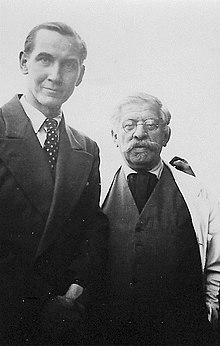User:Valerie and her week of wonders/Transvestite pass
| This is the sandbox page where you will draft your initial Wikipedia contribution.
If you're starting a new article, you can develop it here until it's ready to go live. If you're working on improvements to an existing article, copy only one section at a time of the article to this sandbox to work on, and be sure to use an edit summary linking to the article you copied from. Do not copy over the entire article. You can find additional instructions here. Remember to save your work regularly using the "Publish page" button. (It just means 'save'; it will still be in the sandbox.) You can add bold formatting to your additions to differentiate them from existing content. |

Magnus Hirschfeld
[edit]Career
[edit]Dr. Magnus Hirschfeld was a German physician,sexologist, clinician, and homosexual rights activist.[1] In 1919 Berlin, Hirschfeld founded Institut für Sexualwissenschaft (Institute for Sexual Science), a private sexology research institute.[2] Hirschfeld's theories and research would become theoretical precursors[3] to concepts such as non-binary gender identity, and same-sex love.[4] In 1910 during the Weimar period, Hirschfeld coined the term "transvestism" to describe the act of cross-dressing, as a way to distinguish the act from notions of homosexuality.[5]
Transvestitenschein (Transvestite Pass)
[edit]In 1908-1909 Hirschfeld and psychoanalyst Karl Abraham implemented the first Transvestitenschein (Transvestite Pass).[6]Hirschfeld created

the pass as a form of protection against the incrimination and arrest of cross-dressers from local police authorities as well as providing individuals unimpeded travel.[7]The implementation of the Transvestitenschein (Transvestite Pass) paved the way for further progression amongst transgender rights, such as the ability for legal name change.[8] This was one of the first forms of trans recognition of state-legitimacy.[9]Along with Transvestitenschein (Transvestite Pass) Hirschfeld's institute began offering other services for transgender individuals such as sexual health services, including medical transitioning. [10]
- ^ "Magnus Hirschfeld", Wikipedia, 2023-11-24, retrieved 2023-11-27
- ^ "Institut für Sexualwissenschaft", Wikipedia, 2023-11-20, retrieved 2023-11-27
- ^ Sutton, Katie (2011-04-01). "The Masculine Woman in Weimar Germany: Chapter 1 — "Which One Is the Man?": The Masulinization of Women's Fashions". JSTOR. Retrieved 2023-11-27.
- ^ Mancini, Elena. "The SAGE Encyclopedia of Trans Studies: Hirschfeld, Magnus". Sage Knowledge. Retrieved 2023-11-27.
- ^ Sutton, Katie (2011-04-01). "The Masculine Woman in Weimar Germany: Chapter 1 — "Which One Is the Man?": The Masulinization of Women's Fashions". JSTOR. Retrieved 2023-11-27.
- ^ Sutton, Katie (May 2012). ""We Too Deserve a Place in the Sun": The Politics of Transvestite Identity in Weimar Germany". JSTOR. Retrieved 2023-11-27.
- ^ Sutton, Katie (May 2012). ""We Too Deserve a Place in the Sun": The Politics of Transvestite Identity in Weimar Germany". JSTOR.
- ^ Nunn, Zavier (September 22, 2022). "Trans Liminality and the Nazi State". Oxford Academic.
- ^ Nunn, Zavier (September 22, 2022). "Trans Liminality and the Nazi State". Oxford Academic.
- ^ Nunn, Zavier (September 22, 2022). "Trans Liminality and the Nazi State". Oxford Academic.
